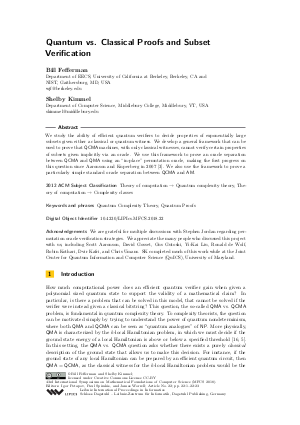Quantum vs. Classical Proofs and Subset Verification
Authors Bill Fefferman, Shelby Kimmel
-
Part of:
Volume:
43rd International Symposium on Mathematical Foundations of Computer Science (MFCS 2018)
Part of: Series: Leibniz International Proceedings in Informatics (LIPIcs)
Part of: Conference: Mathematical Foundations of Computer Science (MFCS) - License:
 Creative Commons Attribution 3.0 Unported license
Creative Commons Attribution 3.0 Unported license
- Publication Date: 2018-08-27
File

PDF
LIPIcs.MFCS.2018.22.pdf
- Filesize: 0.61 MB
- 23 pages
Document Identifiers
Subject Classification
ACM Subject Classification
- Theory of computation → Quantum complexity theory
- Theory of computation → Complexity classes
Keywords
- Quantum Complexity Theory
- Quantum Proofs
Metrics
- Access Statistics
-
Total Accesses (updated on a weekly basis)
0PDF Downloads0Metadata Views
Abstract
We study the ability of efficient quantum verifiers to decide properties of exponentially large subsets given either a classical or quantum witness. We develop a general framework that can be used to prove that QCMA machines, with only classical witnesses, cannot verify certain properties of subsets given implicitly via an oracle. We use this framework to prove an oracle separation between QCMA and QMA using an "in-place" permutation oracle, making the first progress on this question since Aaronson and Kuperberg in 2007 [Aaronson and Kuperberg, 2007]. We also use the framework to prove a particularly simple standard oracle separation between QCMA and AM.
Cite As Get BibTex
Bill Fefferman and Shelby Kimmel. Quantum vs. Classical Proofs and Subset Verification. In 43rd International Symposium on Mathematical Foundations of Computer Science (MFCS 2018). Leibniz International Proceedings in Informatics (LIPIcs), Volume 117, pp. 22:1-22:23, Schloss Dagstuhl – Leibniz-Zentrum für Informatik (2018)
https://doi.org/10.4230/LIPIcs.MFCS.2018.22
BibTex
@InProceedings{fefferman_et_al:LIPIcs.MFCS.2018.22,
author = {Fefferman, Bill and Kimmel, Shelby},
title = {{Quantum vs. Classical Proofs and Subset Verification}},
booktitle = {43rd International Symposium on Mathematical Foundations of Computer Science (MFCS 2018)},
pages = {22:1--22:23},
series = {Leibniz International Proceedings in Informatics (LIPIcs)},
ISBN = {978-3-95977-086-6},
ISSN = {1868-8969},
year = {2018},
volume = {117},
editor = {Potapov, Igor and Spirakis, Paul and Worrell, James},
publisher = {Schloss Dagstuhl -- Leibniz-Zentrum f{\"u}r Informatik},
address = {Dagstuhl, Germany},
URL = {https://drops.dagstuhl.de/entities/document/10.4230/LIPIcs.MFCS.2018.22},
URN = {urn:nbn:de:0030-drops-96040},
doi = {10.4230/LIPIcs.MFCS.2018.22},
annote = {Keywords: Quantum Complexity Theory, Quantum Proofs}
}
Author Details
- Department of EECS, University of California at Berkeley, Berkeley, CA and, NIST, Gaithersburg, MD, USA
References
- Complexity zoo. URL: https://complexityzoo.uwaterloo.ca/Complexity_Zoo.
- Scott Aaronson. Quantum lower bound for the collision problem. In John H. Reif, editor, Proceedings on 34th Annual ACM Symposium on Theory of Computing, May 19-21, 2002, Montréal, Québec, Canada, pages 635-642. ACM, 2002. URL: http://dx.doi.org/10.1145/509907.509999.
-
Scott Aaronson and Greg Kuperberg. Quantum versus classical proofs and advice. In Computational Complexity, 2007. CCC'07. Twenty-Second Annual IEEE Conference on, pages 115-128. IEEE, 2007.

- Scott Aaronson and Yaoyun Shi. Quantum lower bounds for the collision and the element distinctness problems. J. ACM, 51(4):595-605, 2004. URL: http://dx.doi.org/10.1145/1008731.1008735.
-
Dorit Aharonov and Tomer Naveh. Quantum NP - a survey. arXiv preprint quant-ph/0210077, 2002.

-
Andris Ambainis. Quantum lower bounds by quantum arguments. In Proceedings of the thirty-second annual ACM symposium on Theory of computing, pages 636-643. ACM, 2000.

-
Andris Ambainis, Loïck Magnin, Martin Roetteler, and Jérémie Roland. Symmetry-assisted adversaries for quantum state generation. In Computational Complexity (CCC), 2011 IEEE 26th Annual Conference on, pages 167-177. IEEE, 2011.

- Theodore P. Baker, John Gill, and Robert Solovay. Relativizations of the P =? NP question. SIAM J. Comput., 4(4):431-442, 1975. URL: http://dx.doi.org/10.1137/0204037.
-
Aleksandrs Belovs. Variations on quantum adversary. arXiv preprint 1504.06943, 2015.

-
J Niel De Beaudrap, Richard Cleve, and John Watrous. Sharp quantum versus classical query complexity separations. Algorithmica, 34(4):449-461, 2002.

- Shafi Goldwasser and Michael Sipser. Private coins versus public coins in interactive proof systems. In Juris Hartmanis, editor, Proceedings of the 18th Annual ACM Symposium on Theory of Computing, May 28-30, 1986, Berkeley, California, USA, pages 59-68. ACM, 1986. URL: http://dx.doi.org/10.1145/12130.12137.
-
Alex B Grilo, Iordanis Kerenidis, and Jamie Sikora. QMA with subset state witnesses. arXiv preprint arXiv:1410.2882, 2014.

-
Aram W Harrow and David J Rosenbaum. Uselessness for an oracle model with internal randomness. Quantum Information &Computation, 14(7&8):608-624, 2014.

-
Peter Hoyer, Troy Lee, and Robert Špalek. Negative weights make adversaries stronger. In Proceedings of the thirty-ninth annual ACM symposium on Theory of computing, pages 526-535. ACM, 2007.

-
Alexei Yu Kitaev. Quantum computation: Algorithms and error correction. Russian Math. Surveys, 52(6):1191-1249, 1997.

- Alexei Yu Kitaev, Alexander Shen, and Mikhail N Vyalyi. Classical and quantum computation. Number 47 in Graduate Studies in Mathematics. American Mathematical Soc., 2002. URL: http://dx.doi.org/10.1090/gsm/047.
-
Troy Lee, Rajat Mittal, Ben W Reichardt, Robert Špalek, and Mario Szegedy. Quantum query complexity of state conversion. In Foundations of Computer Science (FOCS), 2011 IEEE 52nd Annual Symposium on, pages 344-353. IEEE, 2011.

- Chris Marriott and John Watrous. Quantum Arthur-Merlin games. Comput. Complex., 14(2):122-152, 2005. URL: http://dx.doi.org/10.1007/s00037-005-0194-x.
-
Oded Regev and Liron Schiff. Impossibility of a quantum speed-up with a faulty oracle. In Automata, Languages and Programming, pages 773-781. Springer, 2008.

- Nikolay K. Vereshchagin. Oracle separation of complexity classes and lower bounds for perceptrons solving separation problems. Izvestiya: Mathematics, 59:1103-1122, 1995. URL: http://dx.doi.org/10.1070/IM1995v059n06ABEH000050.
